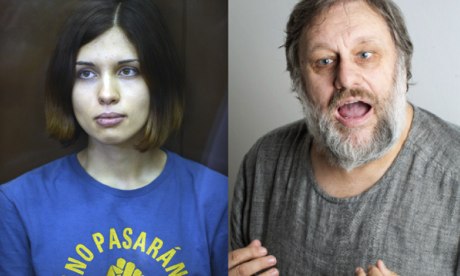Pussy Riot’s Nadezhda Tolokonnikova is currently in a prison hospital in Siberia; here she and Slovenian philosopher Slavoj Žižek meet in an extraordinary exchange of letters.
‘We are the children of Dionysus, sailing in a barrel and not recognising any authority’ … Nadezhda Tolokonnikova of Pussy Riot writing to Slavoj Žižek. Photograph: David Levene/AFP/Getty/Guardian
Dear Nadezhda,
I hope you have been able to organise your life in prison around small rituals that make it tolerable, and that you have time to read. Here are my thoughts on your predicament.
John Jay Chapman, an American political essayist, wrote this about radicals in 1900: “They are really always saying the same thing. They don’t change; everybody else changes. They are accused of the most incompatible crimes, of egoism and a mania for power, indifference to the fate of their cause, fanaticism, triviality, lack of humour, buffoonery and irreverence. But they sound a certain note. Hence the great practical power of persistent radicals. To all appearance, nobody follows them, yet everyone believes them. They hold a tuning-fork and sound A, and everybody knows it really is A, though the time-honoured pitch is G flat.” Isn’t this a good description of the effect of Pussy Riot performances? In spite of all accusations, you sound a certain note. It may appear that people do not follow you, but secretly, they believe you, they know you are telling the truth, or, even more, you are standing for truth. (….)
23 February 2013
Dear Slavoj,
Once, in the autumn of 2012, when I was still in the pre-trial prison in Moscow with other Pussy Riot activists, I visited you. In a dream, of course.
I see your argument about horses, the World Spirit, and about tomfoolery and disrespect, as well as why and how all these elements are so connected to each other.
Pussy Riot did turn out be a part of this force, the purpose of which is criticism, creativity and co-creation, experimentation and constantly provocative events. Borrowing Nietzsche’s definition, we are the children of Dionysus, sailing in a barrel and not recognising any authority.
We are a part of this force that has no final answers or absolute truths, for our mission is to question. There are architects of apollonian statics and there are (punk) singers of dynamics and transformation. One is not better than the other. But it is only together that we can ensure the world functions in the way Heraclitus defined it: “This world has been and will eternally be living on the rhythm of fire, inflaming according to the measure, and dying away according to the measure. This is the functioning of the eternal world breath.” (…)
more: The Guardian


 MMA countdown – Free Artists welcomes the resigned MMA-members!
MMA countdown – Free Artists welcomes the resigned MMA-members! TRANSZPARENCIÁT!
TRANSZPARENCIÁT!